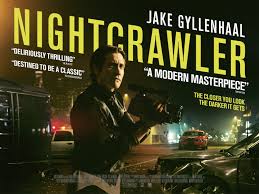
You know how it is - you go and see a movie that's been universally acclaimed and you're sitting there thinking "what was all the fuss about?"
Maybe it's because you've seen all those four and five star write-ups and you unconsciously bristle at the reviewers having seen it first and telling you what to think. Or perhaps it's because the critics occupy their own narrow universe in which no one wants to be seen to be stepping out of line with their colleagues.
Either way, it's hard to equate the rave reviews - including a 94% approval rating on Rotten Tomatoes - with the entertaining but ultimately underwhelming thriller I saw the other night.
In case you don't know, Nightcrawler tells the story of Lou Bloom a scrapyard thief turned TV cameraman hoping to cash in on the "if it bleeds it leads" philosophy of US cable TV.
To say that Lou (Jake Gyllenhall) is "on the spectrum" is to put it mildly; he has no friends, zero social skills, and spends most of his time in front of a computer screen.
Cold-hearted manipulation of the weak is his stock-in-trade. He persuades the hapless, poverty-stricken Rick (a decent turn by Brit Riz Ahmed) to become his navigator cum stooge as they seek to beat their rivals to the goriest crash scenes or worst shootings in L.A.
And then he tries to use his new found camera skills to make whoopee as well as money with vulnerable, ageing TV exec Nina - superbly captured by Rene Russo.
The crisis comes when Lou captures on camera two killers fleeing a murder scene and looks to exploit the full potential of the moment, oblivious to the human consequences.
At the most obvious narrative level - as a suspense story - Nightcrawler works well enough, and there's a lovely grainy quality to the colour reflecting the handheld night vision world of the story.
But as a satire on television, it's a blunt instrument. We have experienced TV execs, for example, who make snap decisions, apparently unaware of the regulatory framework under which they operate and willing to risk huge fines by breaking the rules. Really? If it's all about the money, isn't a bit stupid to run some footage that might cost you thousands of dollars?
These little things matter because Director Dan Gilroy would have us believe that US telly is run by clever, heartless bastards who live only for the bottom line.
Even if its true, there's something so grim about Gyllenhall's stony-faced, dead-eyed depiction of the loner at the heart of the movie that it's hard to care much either way.
Network is sharper and Anchorman is funnier. In their various ways, these movies have set the bar for Hollywood mockery of its local TV industry. They both do it better than this efficient but over-rated film.
Maybe it's because you've seen all those four and five star write-ups and you unconsciously bristle at the reviewers having seen it first and telling you what to think. Or perhaps it's because the critics occupy their own narrow universe in which no one wants to be seen to be stepping out of line with their colleagues.
Either way, it's hard to equate the rave reviews - including a 94% approval rating on Rotten Tomatoes - with the entertaining but ultimately underwhelming thriller I saw the other night.
In case you don't know, Nightcrawler tells the story of Lou Bloom a scrapyard thief turned TV cameraman hoping to cash in on the "if it bleeds it leads" philosophy of US cable TV.
To say that Lou (Jake Gyllenhall) is "on the spectrum" is to put it mildly; he has no friends, zero social skills, and spends most of his time in front of a computer screen.
Cold-hearted manipulation of the weak is his stock-in-trade. He persuades the hapless, poverty-stricken Rick (a decent turn by Brit Riz Ahmed) to become his navigator cum stooge as they seek to beat their rivals to the goriest crash scenes or worst shootings in L.A.
And then he tries to use his new found camera skills to make whoopee as well as money with vulnerable, ageing TV exec Nina - superbly captured by Rene Russo.
The crisis comes when Lou captures on camera two killers fleeing a murder scene and looks to exploit the full potential of the moment, oblivious to the human consequences.
At the most obvious narrative level - as a suspense story - Nightcrawler works well enough, and there's a lovely grainy quality to the colour reflecting the handheld night vision world of the story.
But as a satire on television, it's a blunt instrument. We have experienced TV execs, for example, who make snap decisions, apparently unaware of the regulatory framework under which they operate and willing to risk huge fines by breaking the rules. Really? If it's all about the money, isn't a bit stupid to run some footage that might cost you thousands of dollars?
These little things matter because Director Dan Gilroy would have us believe that US telly is run by clever, heartless bastards who live only for the bottom line.
Even if its true, there's something so grim about Gyllenhall's stony-faced, dead-eyed depiction of the loner at the heart of the movie that it's hard to care much either way.
Network is sharper and Anchorman is funnier. In their various ways, these movies have set the bar for Hollywood mockery of its local TV industry. They both do it better than this efficient but over-rated film.
 RSS Feed
RSS Feed
